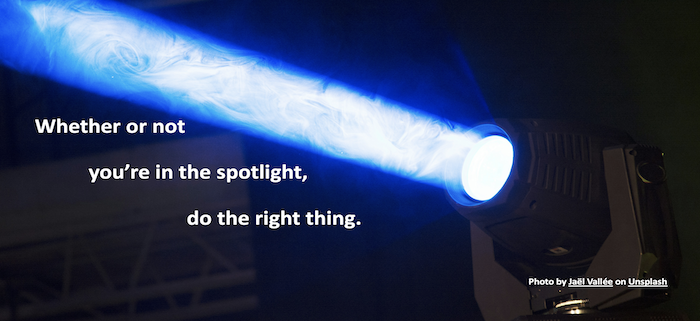Just Do It (The Right Thing)
You’ve probably heard by now about the Coldplay concert and the “Kiss Cam” controversy involving the CEO and head of HR from Astronomer. If not, either you’ve tuned out the news or you’ve been living under a rock.
This isn’t a post to pile on. I’m sure those individuals are experiencing plenty of shame and regret. Their decision didn’t just impact them—it spilled over to colleagues, friends, and especially their families.
What struck me wasn’t just the moment itself, but a LinkedIn post I saw afterward. It reminded leaders that they’re always under surveillance. It mentioned reputation, duty, and leadership. All valid points. But I think it missed the deeper truth.
I chimed in with a comment: “If you focus on doing the right thing… you don’t have to worry about being watched.”
That simple line sparked dozens of likes and thoughtful comments. Why? Because it cuts to the heart of leadership and ethical influence: integrity.
Who Are You When No One’s Watching?
We shouldn’t do the right thing just because we’re afraid of being caught. That’s not integrity—that’s image management. True integrity is doing what’s right even when no one is watching or will ever know.
We’ve all heard that quote. But how often do we stop and reflect on what it means in practice?
Let me be clear: we’re all going to mess up. I certainly have. Like the time I was reading a book on a flight to a training event. I found a story that fit perfectly with a point I wanted to make in my training. It was funny, insightful… and, it turns out, offensive to some in the room.
I didn’t realize it until a longtime coworker—someone I trusted and knew had my best interests at heart—pulled me aside afterward. She gently but directly told me how the story landed. I hear her loud and clear and the next time I addressed that same group, I led with an apology.
Dale Carnegie famously wrote, “When you’re wrong, admit it quickly and emphatically.” That’s not just good advice—it’s good influence. When you take responsibility for your mistakes, people are more likely to trust you again. Why? Because owning up is rare. And rare things stand out.
Influence That Lasts Begins with Trust
In my work teaching ethical influence—whether through LinkedIn Learning, keynotes, or my books—I come back to this truth again and again: You cannot influence people over the long haul without trust.
Robert Cialdini calls this liking and authority—people follow those they feel connected to and respect. Aristotle talked about it too. He called it ethos, one of the three pillars of persuasion. Ethos isn’t just your title or expertise—it’s your character.
People follow your example far more than your words. If your life doesn’t align with your message, your influence will eventually unravel.
Who Are You Accountable To?
One of my favorite Bible verses comes from the apostle Paul. In his first letter to the church at Corinth he wrote: “I care very little if I’m judged by you or any human court; indeed, I do not even judge myself. My conscience is clear, but that doesn’t make me innocent. It’s the Lord who judges me.”
In other words, Paul lived with an internal compass set to a higher standard. Not the court of public opinion. Not the viral spotlight. Not even his own self-assessment. His aim was simple: do what’s right in the eyes of God.
Whether you share that worldview or not, the principle still applies. If your life is grounded in something deeper than optics or outcomes, you’ll stand firm when the spotlight hits—and when it doesn’t.
Final Thought
Would the situation at the concert have been less damaging if the couple hadn’t been outed? Maybe but there still would have been consequences to their choice and that’s the real issue.
Here’s my challenge: Don’t focus on who might be watching. Focus on doing what’s right.
When you live with integrity, you build influence that’s strong enough to withstand scrutiny—and compassionate enough to admit when you fall short.
What’s one decision you’ve made where you chose integrity over convenience? I’d love to hear your story and I’m sure readers would too.
Edited with ChatGPT
Brian Ahearn
 Brian Ahearn is the Chief Influence Officer at Influence PEOPLE and a faculty member at the Cialdini Institute.
Brian Ahearn is the Chief Influence Officer at Influence PEOPLE and a faculty member at the Cialdini Institute.
An author, TEDx speaker, international trainer, coach, and consultant, Brian helps clients apply influence in everyday situations to boost results.
As one of only a dozen Cialdini Method Certified Trainers in the world, Brian was personally trained and endorsed by Robert Cialdini, Ph.D., the most cited living social psychologist on the science of ethical influence.
Brian’s first book, Influence PEOPLE, was named one of the 100 Best Influence Books of All Time by Book Authority. His follow-up, Persuasive Selling for Relationship Driven Insurance Agents, was an Amazon new release bestseller. His latest book, The Influencer: Secrets to Success and Happiness, is a business parable designed to teach you how to use influence at home and the office.
Brian’s LinkedIn courses on persuasive selling and coaching have been viewed by more than 750,000 people around the world. His TEDx Talk on pre-suasion has more than a million views!






Leave a Reply
Want to join the discussion?Feel free to contribute!